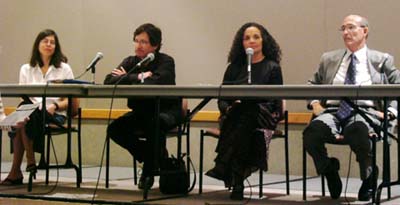|
Border Justice |
|
| Return to Flory's Page |  A cajita memorializing the 205 migrants who died in the Arizona who to make their way across the border I attended two panel discussions at the Migration, Justice and the Border forum that took place Apr. 6-9, 2004 at Arizona State University West. The purpose of the forum was to educate people about the immigration issue in the United States. The immigration issue needs to be addressed because there continues to be a steady flow of migration in the U.S. This country has a lot of people who live here illegally and overstay their visas. Also, many people who try to cross the border die in the desert. I will briefly report on some of the issues discussed on the two panels.
Metropolitan Borderlands: Migrant Justice in Phoenix
I was not surprised to hear about the type of treatment that children and adults are faced with when they migrate and enter the U.S, as told by panelists Shiu Ming Cheer and Suzannah Maclay, attorneys for the Florence Immigrant and Refugee Rights Project. In accordance with the Border Action Network’s report, Justice on the Line, (see Borderlinks page)the fact that children as well as adults are beaten and sexually assaulted as they try to get across the border continues to be a drastic problem for migrants. I strongly disagree with the way that immigrants are being treated. Children should not be treated as criminals just because they want to unite with their parents. I do not feel that children should be put in detention just because they do not have papers to show that they can come to the U.S. Being with their family so they can help them survive is crucial and this is apparent because the children are taking any means to get to their family even if they have to endanger their lives (for example, for getting on freight trains).
Detained adult immigrants should not have to be put in jail either, especially not with murderers. I don’t think there is any justice behind the fact that murderers and robbers can get attorneys to represent them but an innocent immigrant wanting to come to the U.S. so he can feed his family by working, can not obtain an attorney for his case. This was a key point made by attorney Maclay. The Florence Project supplies attorneys for immigrants in this situation. I really can not fathom that after the Sept. 11 attack, Attorney General Ashcroft called immigration along the U.S. borders a national security risk. We are never going to catch the real terrorists if we are focusing too much on immigrants. Immigration is not a militaristic problem but a social problem.
I agree with Salvador Reza, director of Macehualli Work Center, that immigration is a “hard-core economic reality.” We can not deny the fact that the U.S. economy relies heavily on the benefits of immigrants’ work. As was expressed in Marc Cooper’s article, “The Heartland’s Raw Deal,” U.S. companies recruit and hire immigrants without caring about how they are contributing to the immigration debate; their only concern is making good profit at the expense of the rights of immigrant workers.
Immigration Policy and Justice
I would like to briefly discuss the issues given by Isabel Garcia, Attorney at Coalicion Derechos Humanos and Olivia Ruiz, professor at Colegio de la Fontera Norte in Tijuana, Mexico. The two panelists stressed that Americans should look at the immigration issue in its historical context to fully understand its impact in the U.S. Garcia stated that as early as the 1900’s immigration laws had been imposed on immigrants(Chinese) who lived thousands of miles from the U.S. However, attracting immigrants to work here also has been embedded in the U.S. capitalist society for a long time. Garcia stated that historically the responsibility of immigration has passed through several U.S. governmental departments. The first was the department of Treasury, signifying that immigration was an economic issue from which the U.S. benefited. Its current department is Homeland Security, specifying “That migrants are a risk.” (Ruiz)
Both women also addressed the recurring theme, “Welcome as workers, not as citizens.” Americans do not want to naturalize immigrants as, Clark discussed in his article, “New Immigrants” because they have anxieties that do not warrant allowing immigrants to be citizens. One anxiety that Americans have about immigrants is the threat of English no longer being the dominant language. Americans say that people that speak foreign languages create barriers. Ruiz points out that Americans want immigrants to speak English only. Garcia sums up the way in which Americans view migrants’ actions by stating that Americans strongly believe that immigrants are responsible for all our society’s ills. I want to conclude that no matter how Americans feel about immigrants’ status in society, immigration policy should at least be made to uphold human rights.
|
| return to Migration & Culture page | |

